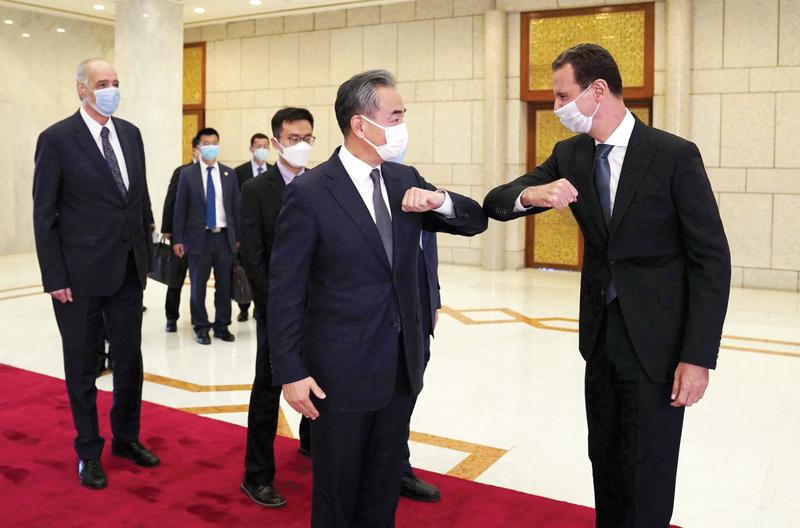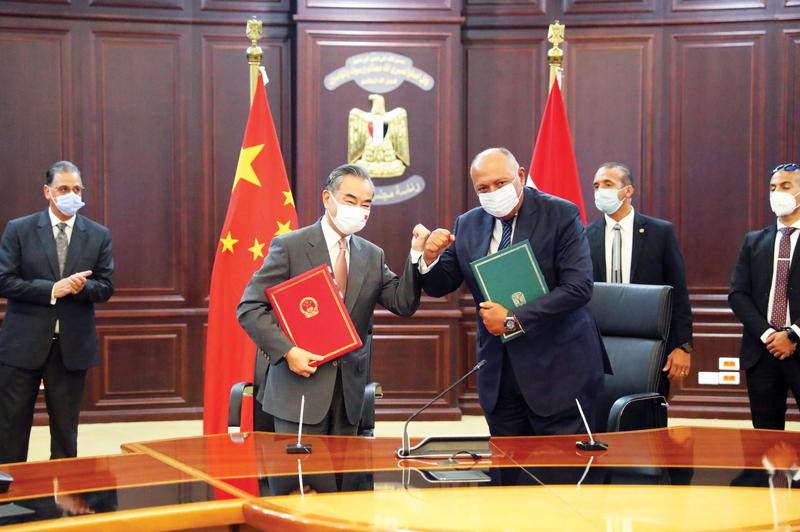 State Councilor and Foreign Minister Wang Yi greets Syrian President Bashar al-Assad (right) during their meeting in Damascus on July 17. Syria was the first stop of the Chinese foreign minister’s 4-day tour across the Middle East and North Africa region, which included trips to Egypt and Algeria. (SYRIAN ARAB NEWS AGENCY / AFP)
State Councilor and Foreign Minister Wang Yi greets Syrian President Bashar al-Assad (right) during their meeting in Damascus on July 17. Syria was the first stop of the Chinese foreign minister’s 4-day tour across the Middle East and North Africa region, which included trips to Egypt and Algeria. (SYRIAN ARAB NEWS AGENCY / AFP)
State Councilor and Foreign Minister Wang Yi called for fresh efforts to promote peace in the Middle East, as he unveiled proposals to help end turmoil in war-torn Syria and bring about a resolution to the Palestine issue.
During his recent 4-day trip to the Middle East and North Africa region, Wang visited Syria, Egypt and Algeria and laid out a road map that can advance the cause of peace and stability in the Middle East.
On July 17, the first day of his latest overseas tour, Wang urged outside countries to stop seeking another power transition in Syria, scrap unilateral sanctions against the country, endorse its fight against terrorism and help the nation fix its internal political rifts.
The four proposals, which represent Beijing’s latest position on helping find a political solution on the Syria issue, were unveiled as Wang met with Syrian President Bashar al-Assad and the nation’s foreign minister, Faisal Mekdad.
Wang was the first foreign dignitary received by Assad since the latter won his fourth term as president in May.
The Chinese foreign minister conveyed President Xi Jinping’s cordial greetings to Assad and said Assad’s re-election reflects the strong trust and support of the Syrian people.
Countries should respect Syria’s sovereignty and territorial integrity and the choice of the Syrian people, abandon the illusion of regime change and let the Syrian people independently decide the future and destiny of the country, Wang said.
Beijing firmly supports Damascus independently exploring its development path and safeguarding national unity and dignity, Wang added.
Sanctions imposed on Syria by some Western countries, such as the United States, have drawn widespread criticism as the moves are believed to have undermined reconstruction efforts and aggravated the humanitarian crisis.
Wang said the fundamental fix to the humanitarian crisis in Syria is to “immediately lift all unilateral sanctions and economic blockades” against the country.
He stressed the need to respect the Syrian government’s achievements and the leading role it has played in fighting terrorism, while warning against manipulation that seeks separatism in the country under the pretext of counterterrorism.
Deepening ties
Assad said that Syria sincerely appreciates China’s great help and its fair position on the Syrian issue.
Syria is committed to deepening its friendly cooperation with China and supports China unconditionally on issues related to Taiwan, Xinjiang and Hong Kong, Assad said.
The Belt and Road Initiative and the battle against COVID-19 were among other major topics that came up during Wang’s Syria trip.
On bilateral cooperation, Wang said China will continue offering strong support to Syria in its COVID-19 fight by providing vaccines and other medical supplies, and that it will support the country in speeding up its reconstruction.
Beijing welcomes Damascus to become a new partner in jointly building the Belt and Road Initiative, Wang added.
On July 17, Wang attended a ceremony with Mekdad, the Syrian foreign minister, for signing cooperative agreements.
Mekdad endorsed China as an important and close friend of Syria, and said Syria is ready to sign a deal with China on co-building the Belt and Road.
Later, during his visit to Egypt on July 18, Wang offered three new proposals for realizing the “two-state solution” in an aim to help end lasting conflicts between Palestine and Israel.
He called for efforts to empower the Palestinian Authority, to advance solidarity among all Palestinian factions and to resume Palestine-Israel peace talks.
To empower the Palestinian Authority, China proposes granting it the power to exercise national sovereign functions in areas such as security and finance to help it effectively manage and control the autonomous and occupied Palestinian territories, according to Wang.
 State Councilor and Foreign Minister Wang Yi and his Egyptian counterpart Sameh Shoukry greet each other at a ceremony in Alamein, Egypt, on July 18. The two foreign ministers attended a ceremony marking the joint production of 1 million doses of COVID-19 vaccines in Egypt. (SUI XIANKAI / XINHUA)
State Councilor and Foreign Minister Wang Yi and his Egyptian counterpart Sameh Shoukry greet each other at a ceremony in Alamein, Egypt, on July 18. The two foreign ministers attended a ceremony marking the joint production of 1 million doses of COVID-19 vaccines in Egypt. (SUI XIANKAI / XINHUA)
For greater solidarity among Palestinian factions, internal reconciliation should be achieved through consultations and talks so they can form a unanimous position to negotiate for settling the Palestinian issue, Wang said.
Palestine and Israel should be encouraged to resume peace talks on the basis of the “two-state solution”, he said, adding that China welcomes dignitaries of both sides to come to China for direct negotiation.
China calls for convening a global peace conference led by the UN, with participation by the UN Security Council’s permanent members and all stakeholders in the Middle East peace process, in order to pursue a comprehensive, lasting and just settlement and the peaceful coexistence of Palestine and Israel, Wang said.
He explained the new proposals in separate meetings on July 18 with Egyptian Foreign Minister Sameh Shoukry and Arab League Secretary-General Ahmed Aboul-Gheit.
Shoukry and Aboul-Gheit said they agree with the ideas that China put forth. They praised Beijing’s positive influence regarding the Palestinian issue and expressed readiness to closely communicate and coordinate with China on the issue.
Beijing played a proactive role in cooling one of the worst Palestine-Israel flare-ups of tension in May as it continued mediating for peace with its presidency of the UN Security Council that month.
During Wang’s talks with the Egyptian foreign minister in Alamein, a coastal city in northern Egypt, China and Egypt decided to jointly donate 500,000 doses of COVID-19 vaccines to Palestinians in the Gaza Strip to address the immediate needs there.
Both countries believe that the humanitarian situation in Gaza should be given attention when seeking settlement of the Palestine issue, according to China’s Foreign Ministry.
Shared destiny
On July 18, Wang and Shoukry attended a ceremony marking the joint production of 1 million doses of COVID-19 vaccine in Egypt.
During a meeting with Wang the same day, Egyptian President Abdel Fattah al-Sisi said he appreciates China’s vaccine assistance and its help in achieving local production of vaccines.
A joint statement issued on July 18 by China’s Foreign Ministry and the Secretariat General of the League of Arab States called for greater international cooperation in controlling the pandemic, preventing the further spread of COVID-19 and localizing vaccine production.
The statement voiced a shared objection to politicizing the pandemic and called for a scientific approach to tracing the origin of the virus.
On July 19, during a visit to Algeria, Wang underlined Beijing’s commitment to supporting fellow developing nations, saying that China will “always bear empathy and share destiny with developing countries”.
He made the remarks when meeting the media alongside Algerian Foreign Minister Ramtane Lamamra.
Fifty years ago, a large number of developing countries such as Algeria played a key role in helping the People’s Republic of China achieve its return to the United Nations.
In 1971, countries including Algeria proposed and supported the UN General Assembly Resolution 2758, which restored all rights to the People’s Republic of China.
In recalling how the resolution was passed with an overwhelming majority, Wang said the action was “a vivid portrayal of the unity and cooperation between China and (fellow) developing countries”.
Wang said his latest visit gave him a chance to once again express Beijing’s heartfelt thanks to Algeria and all friends from other countries who “withstood pressure, upheld justice and firmly supported China at that time”.
Beijing will continue to work with developing countries to further safeguard their legitimate rights and boost their voice in international governance, he said.
Lamamra told reporters that China is a representative of developing countries and nonaligned nations, and is a partner of African and Arab countries.
China helps international relations achieve democratization and make the world more balanced, the Algerian minister said, adding that his nation expects China to play a greater role in the UN and the Security Council.


